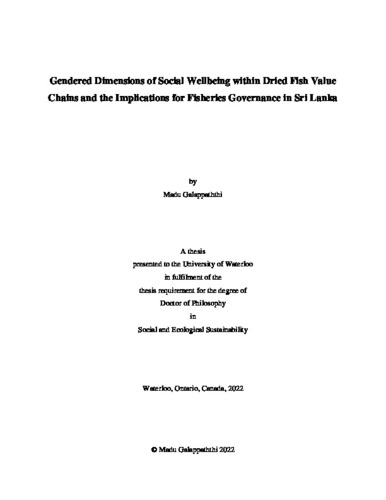| dc.description.abstract | Dried fish is a sub-sector within small-scale fisheries that makes significant contributions to livelihoods, wellbeing, and survival of fishing communities. The term ‘dried fish’ refers to the fish processed using simple, low-cost, low-technology methods such as sun-drying, salting, fermenting, and smoking. The dried fish sub-sector is organized into value chains, which encompass a series of sequential activities from fish harvesting to processing, trading, distribution, and consumption.
Dried fish value chains are deeply gendered through the division of labour that exists within them. Women make up about half of the fish drying workforce and they are also employed across the value chains. However, women’s presence in dried fish value chains and their contributions are rarely documented and remain ‘invisible’. Furthermore, women face significant challenges in equitably benefitting from their value chain participation. Nonetheless, women are rarely involved in any decision-making concerning the challenges they face or the resources they interact with. A particular research gap exists in relation to the nuances of how women and men participate in these value chains and pursue wellbeing. Addressing this gap is crucial to identify opportunities to better support the wellbeing of those who critically depend on dried fish value chains.
The purpose of this research is to advance a gender-sensitive understanding of how dried fish value chains support social wellbeing, with a focus on women’s experiences, and to explore the implications for fisheries governance. Three objectives frame this research: (1) to develop a conceptual framework based on existing literature to integrate gender within the study of dried fish value chains; (2) to critically assess women’s experiences in governing small-scale fisheries more broadly; and (3) to empirically examine how dried fish value chains support gendered dimensions of social wellbeing and identify implications for fisheries governance in Sri Lanka.
An integrated framework was first developed to broaden the conceptual and analytical scope of the study of gender within dried fish value chains. The framework established the direction of this research and also offered guidance to ongoing scholarship at the intersection of gender and small-scale fisheries more broadly. The framework was developed by linking three complementary areas of literature: value chains, social wellbeing, and intersectionality. Three case examples from Bangladesh, Tanzania, and Sri Lanka were also drawn from literature to demonstrate the application of the framework in systematically unpacking the complexity of gendered value chain experiences. Notably, the conceptual and analytical linkages encouraged by this framework resulted in a deeper analysis of gender relations within dried fish value chains with a focus on how certain groups are uniquely disadvantaged.
Next, a systematic scoping review was used to survey the global empirical literature to examine women’s experiences in influencing and shaping small-scale fisheries governance. The review identified, characterized, and synthesized 54 empirical cases at the intersection of gender and SSF governance. Findings of the review revealed the crucial need to expand the current evidence base on this topic and enabled the synthesis of a typology of governance tasks performed by women. These tasks include leadership roles, relational networking and collective action, resource monitoring, and knowledge sharing. The review addressed an important gap in the literature, and helped highlight the opportunities to improve women's participation in governance and advance gender equality.
Finally, a comparative analysis of two distinct dried fish value chain cases from Sri Lanka — an urban coastal value chain and a rural inland freshwater value chain — was used to empirically examine the social wellbeing experiences of women and men participating in these value chains. The cases allowed for the examination of diversity of dried fish value chains and the place-based nature of livelihood opportunities supported by them. The cases were developed using in-depth field interviews (n=70) with dried fish producers and key informant interviews (n=19) with stakeholders who has influence over value chain activities (e.g., community leaders, fisheries managers, and development officers). The comparative analysis highlighted that the people participating in both coastal and inland dried fish value chains derive material, relational, and subjective wellbeing in nuanced ways, with substantial differences between the experiences of women and men. For example, all full-time fish drying sites in the coastal community are owned and operated by men whereas women only participate as wage workers in these sites. Findings revealed that dried fish value chains are of disproportionate importance to the wellbeing of socio-economically marginalized people in fishing communities. The findings also revealed that increased commercialization has a negative impact on women’s participation in value chains and the relational underpinnings in safeguarding interests of marginalized groups in general. Moreover, increased commercialization appeared to put intergenerational capacity to support wellbeing at risk.
Outcomes of this study have the potential to inform policy and practice interventions that seek to foster gender equitable wellbeing outcomes in fishing communities. For instance, findings highlight that recognizing the value chain roles performed by women requires counting different types of fish drying operations whereas supporting their wellbeing requires a range of solutions that can safeguard the diverse community-embedded value chain activities. While findings specifically address dried fish value chains, they hold relevance and applicability to fisheries and natural resource governance more broadly. | en |

